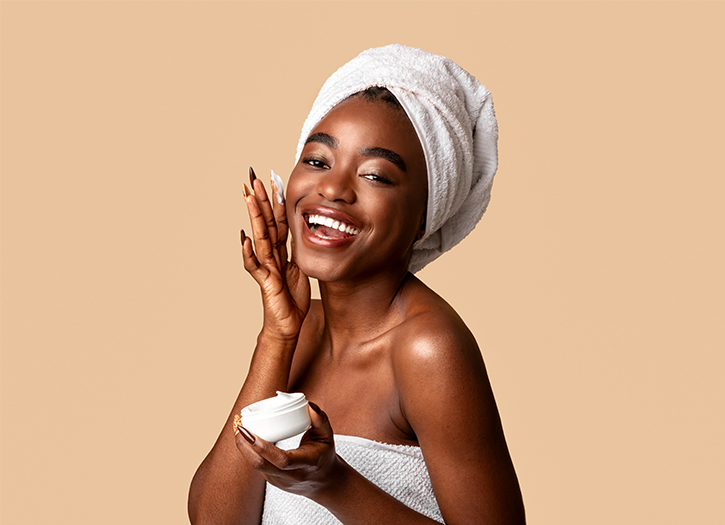Eczema affects an estimated 30 percent of the U.S. population, and most sufferers have something in common — melanated skin.
While eczema may appear at any age, it often pops up during childhood, with Black and Hispanic children experiencing the disease at higher rates and with more extreme symptoms than their white counterparts. In fact, according to the National Eczema Association, eczema affects around 20 percent of Black children, and Black children are almost 2% more likely to develop eczema.
So what can we do?
The exact origins of eczema remain shrouded in mystery, but there’s been much light shed on the nature of the condition in recent times. Better yet, with research, there has been an influx of exceptional products on the market that help soothe and treat melanated skin affected by eczema.
Ins and Outs of Eczema
What exactly is eczema? Dr. Mona Gohara, Vice President of the Women’s Dermatologic Society and medical expert for outlets like ELLE, Cosmopolitan, Vogue, and more, sums it up.
“With any form of eczema, its hallmark is that it itches. So if your skin isn’t itchy, it ain’t eczema, point blank, period,” she quips.
That’s no exaggeration. While other symptoms of eczema include dry skin, rash, and raised bumps (especially in melanated skin), itchiness is the most prevalent manifestation of eczema.
Eczema is caused by “overactivity of one arm of the immune system and barrier defect.” Basically, the body overreacts to a perceived threat in the external world and attempts to “protect” the skin, resulting in the symptoms that make up what we know as eczema.
According to Dr. Gohara, there are over 50 types of eczema. Atopic dermatitis is the type most commonly seen, which also usually begins to show up during childhood. In a study by the Asthma and Allergy Foundation of America (AAFA), atopic dermatitis affects about 7.3% of adults in the U.S., with 40 percent of those affected having severe symptoms.
“Atopic dermatitis can be an exceptionally debilitating disease,” Gohara told us, expounding on the mental and emotional effects of eczema. The numbers are there to back it up.
The same study done by the AAFA showed that 16.5 million adults in the U.S. are plagued by sleep disturbance and emotional discomfort in addition to the physical pain that comes with eczema.
Skin Specifics
The effects of eczema impact everyone differently — especially when it comes to melanated skin versus non-melanated skin.
“In darker skin, it can appear to be different hues of greys, browns, purples… it’s a different hue altogether because we have a baseline of brown. Inflammation is always reddish, but that shows up differently if you have brown skin. If you add red to brown, it looks different than if you add red to white. That’s just the way it is,” Dr. Gohara explains.
Thankfully, the times of guesswork are gone when figuring out what issues like eczema might look like on melanated skin. See My Skin is an unprecedented (and Dr. Gohara approved) resource “where melanin-rich skin is the default, not an afterthought.” This platform explicitly addresses eczema and other skin disorders and how they manifest for people with melanated skin.
“The more you can see images of what it looks like and be armored with information… the better,” Dr. Gohara advises.
Melanated Mindset
Part of loving the skin you’re in is knowing what makes it unique so you can help it thrive. The fact is that Black and brown skin contains fewer ceramides in the upper layer of the skin, which causes it to be drier — significantly when it’s being affected by eczema as well.
“When I talk to my patients who have Black and brown skin, I’m like the first thing we need to do is get you a moisturizer that has more ceramides in it, or a cleanser that makes you build ceramides because that’s exceptionally important,” Dr. Gohara says.
For cleansers, toners, and moisturizers designed with melanin-rich skin in mind, we love the MELĒ Skincare line. Co-created with and endorsed by dermatologists and skincare experts of color, these products gently cleanse and target inflammation while protecting and hydrating.
Some of the best products for your skin are also your current faves.
“The mainstay of treatment is really just a good skincare routine where you have really good cleansers like Dove depositing moisture into the skin, gentle enough not to disrupt the skin barrier and moisturizing products like Vaseline to really keep water locked in,” Gohara observes.
When it comes to melanin-rich skin and atopic eczema, it’s all about maintenance, “concentrating on a good skin routine that has gentle cleaners and exceptionally hydrating moisturizers.”







Add Comment
You must be logged in to post a comment.